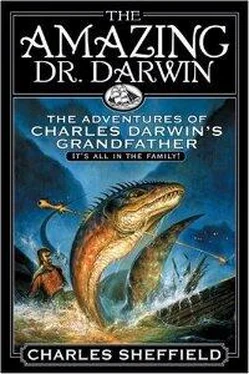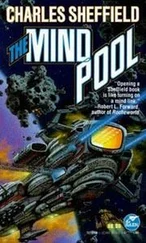“Bear with them? Sheepskins?”
“Not something you could see, Jacob. Disease . The fiends are carriers of plague. That’s what Odirex discovered, when he discovered them. Don’t ask me how he escaped the effects himself. That’s what he used to drive away the Romans. If you look back in history, you’ll find there was a big outbreak of plague in Europe, back about the year four hundred and thirty—soon after the Romans left Britain. People have assumed that it was bubonic plague, just like in the Black Death in the fourteenth century, or the Great Plague here a hundred years ago. Now, I am sure that it was not the same.”
“Wait a minute, Erasmus. If the fiends carry plague, why aren’t all the folk near Cross Fell dead?”
“Because we have been building up immunity, by exposure, for many hundreds of years. It is the process of selection again. People who can resist the plague can survive, the others die. I was struck down myself, but thanks to our improved natural resistance, and thanks also to the potion that the red fiend made me drink, all I had was a very bad day. If I’d been exposed for the first time, as the Romans were, I’d be dead by now.”
“And why do you assert that it was not bubonic plague? Would you not be immune to that?”
“I don’t know. But I became sick only a few hours after first exposure to the fiends— that is much too quick for bubonic plague.”
“Aye,” said Pole. “It is, and I knew that for myself if I thought about it. So Odirex used his ‘treasure’ against the Romans. Can you imagine the effect on them?”
“You didn’t see me,” said Darwin, “and I only had the merest touch of the disease. Odirex could appear with the fiends, contaminate the Roman equipment—touching it might be enough, unless personal contact were necessary. That wouldn’t be too difficult to arrange, either. Then, within twelve hours, the agony and deaths would begin. Do you wonder that they called him Odii Rex , the King of Hate? Or that they so feared his treasure that they fled this part of the country completely? But by then it was too late. They took the disease with them, back into Europe.”
Pole looked out at the snow, now beginning to settle on the side of the road. He shivered. “So the fiends really are fiends, after all. They may not intend to do it, but they have killed, just as much as if they were straight from Hell.”
“They have indeed,” said Darwin. “More surely than sword or musket, more secretly than noose or poison. And all by accident, as far as they are concerned. They must have developed their own immunity many thousands of years ago, perhaps soon after they branched off from our kind of humanity.”
Jacob Pole reached into the hamper and pulled out a bottle of claret. “I’d better start work on the food and drink, too, Erasmus,” he said morosely. “Otherwise you’ll demolish the lot. Don’t bother to pass me food. The wine will do nicely. I’ve had another disappointment, and I want to wash it down. Damn it, I wish that once in my lifetime— just once—I could find a treasure that didn’t turn to vapor under my shovel.”
He opened the bottle, settled back into the corner of the coach seat, and closed his eyes. Darwin looked at him unhappily. Jacob had saved his life in the mine, without a doubt. In return, all that Pole had received was a bitter letdown.
Darwin hunched down in his seat and thought of all that he had omitted to say, to Jacob and to the Thaxtons. In his pocket, the necklace from the female fiend seemed to burn, red-hot, like the bright red gold from which it was made. Somewhere in their explorations of the tunnels under Cross Fell, the fiends had discovered the gold mine that had so long eluded the other searchers. And it was plentiful enough, so that any fiend was free to wear as much of the heavy gold as he chose.
Darwin looked across at his friend. Jacob Pole was a sick man, and they both knew it. He had perhaps two or three more years, before the accumulated ailments from a lifetime of exploration came to take him. Now it was in Darwin’s power to satisfy a life’s ambition, and reveal to Jacob a true treasure trove, up there on Cross Fell. But Darwin also remembered the look in the red fiend’s eyes, when he had asked for peace for his people as the price for his medical secrets. More disturbance would break that promise.
Outside the coach, the snow was falling heavier on the Tees valley. Without doubt, it would be a white Christmas. Darwin looked out at the tranquil scene, but his mind was elsewhere and he felt no peace. Jacob Pole, or the red fiend? Very soon, he knew that he would have to make a difficult decision.
Appendix:
Erasmus Darwin, Fact and Fiction
The facts about the life of the man who was arguably the greatest Englishman of the eighteenth century are straightforward enough.
Erasmus Darwin, the grandfather of Charles Darwin, was born on December 12th, 1731. He spent his childhood in Nottinghamshire, went up to St. John’s College, Cambridge, in 1750, and took his BA degree in 1754. Next he moved to Edinburgh and studied medicine there for two years. Following a very brief attempt to set up a practice in Nottingham, Darwin after only two months moved to Lichfield, a town about fifteen miles north of Birmingham. There he gradually built up a huge reputation as a physician, which followed him to Derby when he moved to that town in the 1780s.
He married twice: in 1757 to Mary Howard, who bore him five children and died in 1770; and in 1781 to Elizabeth Pole, the widow of Colonel Pole of Radburn Hall in Derby (more on this later) who bore him seven children. Between his two marriages he consoled himself with the company of a lady who may or may not have been called Parker. At any rate, she bore him two children who were known as the Misses Parker and who when adult ran a boarding school for girls in Derbyshire.
Through the 1780s and 1790s Darwin became steadily more and more famous, to the point where he endured constant persuasion to move to London from his would-be patients—including King George III, who would gladly have appointed Darwin as Court Physician. He resisted all attempts, and at age 70 died in Derby on April 18th, 1802.
So far this seems like the typical life of a middle-class English gentleman, more successful than most in his chosen career but certainly not the stuff of legends. It is only when we look closer that Darwin begins to surprise us. He was the most famous doctor of his day and the last resort for difficult cases, particularly where mental problems were involved. His treatments were original, sometimes daring, and throughout his career he had a very high proportion of “miracle” cures.
In addition to his main profession, Darwin was also a best-selling poet. In that field he attempted and succeeded in the apparently impossible: the complete exposition of contemporary ideas in geology, botany, biology, technology, and the history of the natural world—in rhymed couplets. His two major poetic works were lengthy, The Botanic Garden and The Temple of Nature , and in the latter he presented his own theory of evolution. Two generations before Charles Darwin, Erasmus understood perfectly well the idea of the survival of the fittest, and he knew the importance of mutations in modifying a species. However, he also believed that acquired characteristics might be inherited, a discredited idea that found its most famous expression in the nineteenth century work of Lamarck.
Samuel Johnson, 21 years older than Erasmus Darwin, was also born in Lichfield but chose to make his home in London. Perhaps that was just as well. Like Dr. Johnson he did not welcome rivals, and Lichfield was scarcely big enough for both of them. If we suspect that the intellectual company and competition in the English Midlands was less than in London, we must also note that Darwin founded the Lunar Society, which drew into it an incredible array of talented people—albeit more concerned generally with the sciences than the arts.
Читать дальше












